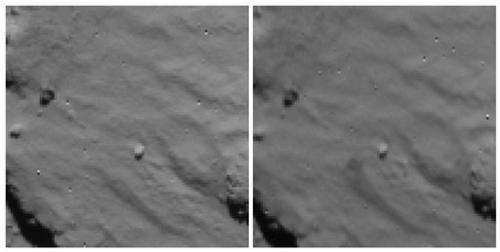This is a combination photo of two images released by the European Space Agency, ESA, Sunday Nov. 16, 2014. ESA says it provides strong indication that Philae touched down for the first time almost precisely where intended. The photo on the left was taken about 3 min 34 sec before touchdown, the photo on the right 1 min 26 sec after by the navigation camera (NAVCAM) on board Rosetta as the orbiter flew over the (intended) Philae landing site on Nov. 12. The touchdown is seen as a dark area in the lower center of the right image which is considered as strong indication that the lander touched down at this spot (possibly raising dust from the impact). They were taken from a distance of about 15 km from the surface, Since landing Wednesday on comet 67P/Churyumov-Gerasimenko some 311 million miles (500 million kilometers) away, the lander has performed a series of scientific tests. (AP Photo/ESA Rosetta/NAVCAM)
The European Space Agency says that its scientists are taking a bit of a break after working for four days around the clock since the pioneering lander Philae touched down on a comet.
ESA spokeswoman Jocelyn Landeau-Constantin told The Associated Press that most of the agency's scientific teams were resting Sunday "after several sleepless nights."
Nonetheless, some scientists were still busy evaluating the data that Philae sent down to ESA on Saturday before its depleted batteries forced it to go silent.
Philae landed Wednesday on comet 67P/Churyumov-Gerasimenko about 311 million miles (500 million kilometers) from Earth, but then settled next to a cliff that largely blocked sunlight from reaching its solar panels.
Landeau-Constantin says scientists are studying the data to see if their experiments on the comet were successful.
© 2014 The Associated Press. All rights reserved.
























